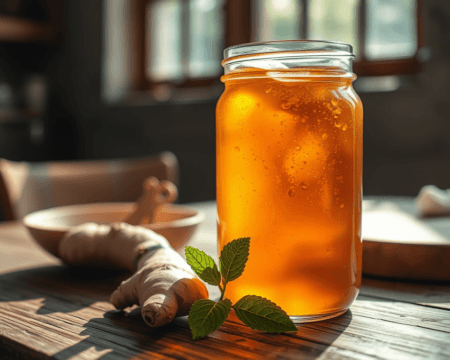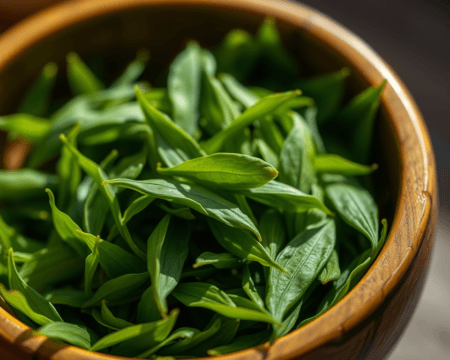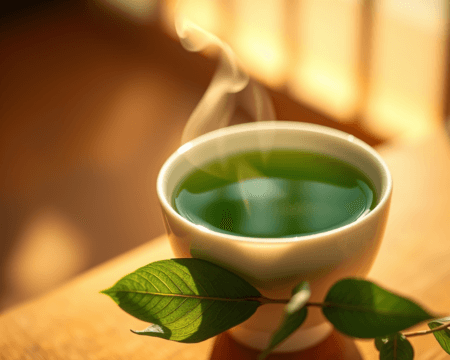Struggling with Polycystic Ovarian Syndrome (PCOS) can feel like a relentless rollercoaster ride—irregular periods, fluctuating hormone levels, and an onslaught of symptoms that can derail your day-to-day life. Fortunately, there’s a beacon of hope that many are increasingly turning to in their quest for relief: herbal teas. That’s right—these colorful, aromatic brews aren’t just for cozy evenings or afternoon relaxation; they can play a significant role in managing some of the debilitating aspects of PCOS.
Key Takeaways:
– Herbal teas like spearmint, green tea, and hibiscus offer unique hormonal benefits for PCOS.
– Regular consumption can lead to improved insulin sensitivity, reduced testosterone levels, and more balanced reproductive hormones.
– Incorporating these teas into your routine can promote overall well-being while tackling PCOS symptoms so many face daily.
Understanding PCOS and Hormonal Imbalance
What is PCOS?
Let’s start with the basics. PCOS stands for Polycystic Ovarian Syndrome, and it’s a hormonal disorder that affects people with ovaries during their reproductive years. Roughly 1 in 10 women in their childbearing years are estimated to have PCOS, and the symptoms can range from irregular periods and weight gain to fertility issues and insulin resistance. It’s like your body decided to throw a hormonal party, but forgot to send out the invitations to balance things out.
The root cause of these symptoms often lies in some serious hormonal imbalances, primarily within the endocrine system. With PCOS, you can expect issues like elevated androgen levels, which can lead to acne, hair growth (hello, unwanted facial hair), and even hair loss on your head. It’s a frustrating and exhausting cycle that leaves many feeling isolated and overwhelmed. But don’t worry—knowledge is power, and understanding your hormones is the first step in taking control of your health.
Hormonal Impact of PCOS
PCOS is like a multifaceted puzzle with each piece contributing to hormonal imbalance. You’re likely dealing with an excess of androgens, a disruption of your menstrual cycle, and potential complications with insulin sensitivity that can lead to metabolic syndrome. Those reproductive hormones—progesterone, estrogen, and testosterone—can become severely imbalanced, impacting everything from your mood to your energy levels.
When testosterone is on the rise, it can mess with your menstrual cycle, making it unpredictable and often painful. Elevated insulin levels can further exacerbate these issues, leading to weight gain and fertility hurdles. Achieving hormone balance isn’t just a nice idea; it’s essential for those struggling with PCOS. Here’s where herbal teas come in, offering a natural, supportive way to boost your health.
Herbal Teas Beneficial for PCOS
Spearmint Tea
Now let’s bring in the star of the show: spearmint tea. This isn’t just your average refreshing brew—studies have shown that spearmint can actively reduce testosterone levels in women with PCOS. So if you’re tired of that unwanted hair or bothersome acne, a cup of spearmint tea might just be your new best friend.
First off, mentha spicata, as it’s scientifically known, is credited with remarkable anti-androgen properties. Brewing it is simple; just steep a teaspoon of dried spearmint leaves in hot water for about 5-7 minutes. The aroma is soothing, and the flavor? Refreshingly minty! This tea not only aids in hormone balance, but you’ll also enjoy the additional benefits of relieving stress and promoting digestive health. Try to consume a couple of cups a day, and watch how these little green leaves can shift your hormonal health.
Green Tea
Next up is green tea—an absolute powerhouse in the herbal arsenal. It boasts a robust profile full of antioxidants, especially catechins like EGCG (epigallocatechin gallate). These compounds have been shown to improve insulin sensitivity and support weight management, making it a stellar choice for anyone dealing with PCOS.
Think about it: when you’re juggling those pesky symptoms, a metabolism boost is just what the doctor ordered. Green tea can help regulate blood sugar levels, vital for maintaining hormonal balance. The best way to brew this beauty is with hot water slightly below boiling point—around 175°F—steeping it for about 2-3 minutes. Sipping on this daily can promote greater overall hormonal health, boost your metabolism, and even help you shed those stubborn pounds.
Chamomile Tea
Feeling cranky? Can’t catch some Z’s? Chamomile tea is where it’s at! Known for its calming effects, Chamomile can do wonders for your body, especially when stress is contributing to your PCOS symptoms. Stress directly influences your hormonal health, and if you’re not getting restful sleep, your body is likely to retaliate with disparity in hormone production.
Chamomile, scientifically referred to as Matricaria chamomilla, is a natural anti-inflammatory and sedative. Steep a few dried flower heads in hot water for about 5 minutes, and you’re in for a treat that can not only help ease anxiety but may also relieve menstruation discomfort. If you’re looking for a gentle nudge towards hormonal stability, chamomile should be a staple in your tea routine. A good night’s sleep can truly work wonders in helping regulate those pesky hormones.
Hibiscus Tea
Let’s add a touch of color with hibiscus tea. This vibrant red infusion, derived from Hibiscus sabdariffa, isn’t just pretty to look at; it provides essential benefits that directly address hormonal imbalances. One significant perk? Hibiscus has been associated with regulating menstrual cycles and controlling blood pressure.
Packed with antioxidants, hibiscus tea can help stave off oxidative stress in your body, which is particularly important when it comes to maintaining hormone levels. Brew your hibiscus tea simply with about 2-3 teaspoons of dried hibiscus petals in boiling water. Soak for about 5-10 minutes, depending on how intense you like it. Enjoy this tangy, refreshing beverage hot or chilled. Drinking it regularly may not only help support fertility but also provide a delightful alternative to sugary sodas and juices.
Raspberry Leaf Tea
Lastly, I can’t talk about herbal teas for PCOS without mentioning raspberry leaf tea. If you’re looking for uterine support, this herbal wonder has a long-standing tradition in reproductive health. Renowned for its ability to tone the uterus and promote menstrual cycle regulation, raspberry leaf can be a game-changer.
With its scientific name, Rubus idaeus, the leaves of this plant are often brewed to bolster reproductive health. Steeping dried leaves in hot water for 10-15 minutes produces a flavorful, earthy infusion that many find comforting. This tea can also aid in pregnancy support, offering nutrients beneficial for women looking to conceive. It’s definitely worth adding to your routine, as balancing those hormones can create a clearer path toward overall wellness.
Incorporating Herbal Teas into Your Daily Routine
Best Practices for Brewing Herbal Teas
Now that you’re all set with the best herbal teas for PCOS, let’s tackle how to incorporate them into your daily life. Brewing tea might seem simple, but ensuring you’re extracting all those amazing benefits means getting a few details right. Use fresh, quality herbs—whether dried or fresh—and always opt for filtered water for the purest taste.
A good rule of thumb for tea steeping times is:
– Spearmint Tea: 5-7 minutes
– Green Tea: 2-3 minutes at around 175°F
– Chamomile Tea: 5 minutes
– Hibiscus Tea: 5-10 minutes
– Raspberry Leaf Tea: 10-15 minutes
Keeping your water temperature optimal for each type is key to unlocking the flavors and health benefits they offer. Experiment with cold brewing, which can sometimes yield a smoother taste and make it easier to drink throughout the day.
Recommended Daily Intake
Everybody’s different, so there’s no one-size-fits-all answer to how much herbal tea you should drink, but here are some standard recommendations to consider. Aiming for around 2-3 cups daily for the teas with hormonal benefits is a safe starting point; you can adjust based on how your body responds.
It’s essential to listen to your body, though. Some people might encounter mild side effects like stomach upset or headaches with certain herbs, especially when trying them for the first time. Always give your doctor a heads-up if you’re adding herbal teas into your diet, especially if you’re on medications related to PCOS or hormonal health.
Personal Experiences and Anecdotes
Stories from PCOS Sufferers
The community support surrounding PCOS can be empowering. I’ve connected with countless individuals sharing their journeys who have successfully integrated herbal teas into their routines. For example, one friend shared how switching to spearmint tea dramatically reduced her acne, while another found comfort and relief with chamomile after stressful workdays.
There’s a genuine camaraderie in sharing these experiences and receiving tactical advice from others navigating similar health challenges. This shared knowledge fosters a sense of hope and encouragement when it feels like you’re swimming upstream against hormonal imbalances. Talking about your experiences while seeking natural remedies helps build a network of support that can make the journey a bit easier.
Expert Insights on Herbal Teas and PCOS
When it comes to expert opinions, health professionals increasingly laud the benefits of herbal teas as part of a natural approach to managing PCOS. Nutritionists often integrate herbal remedies like spearmint and green tea into their dietary recommendations, advocating for their potential to balance hormones effectively.
Research underscores the importance of lifestyle changes—including diet, exercise, and stress management—as critical components of PCOS management. This isn’t just about sipping tea and expecting miracles; it’s about making holistic improvements to your life. Academic research is rolling in, supporting the ingestion of these teas as an effective way to aid hormonal equilibrium, and that should be enough to make anyone take note of their cup of herbal goodness.
Scientific Research on Herbal Teas and PCOS
Overview of Studies on Tea’s Effects on Hormones
If you’re curious about the numbers, let’s talk research. Studies on herbal teas and their effects on hormonal health for PCOS are steadily emerging, shedding light on the real benefits of these beverages. For instance, a noteworthy clinical trial highlighted that spearmint tea consumption led to significant reductions in testosterone levels among PCOS sufferers. That’s not just anecdotal; it’s solid data-backed information showing promise for those looking for natural relief.
The same goes for green tea; plenty of evidence indicates that its core ingredient, EGCG, substantially improves insulin sensitivity. This isn’t just about feeling good; it’s about scientific validation of herbal remedies, proving that what you sip could very well be the lifeline you’ve been searching for.
Summary of Findings Related to PCOS
When summarizing the key findings, herbal teas show genuine potential in tackling some of the core complications associated with PCOS. Research has demonstrated that:
– Spearmint Tea effectively reduces androgen levels.
– Green Tea improves insulin sensitivity and aids in weight management.
– Hibiscus Tea supports hormonal regulation and menstrual cycle regularity.
These findings underscore the importance of embracing herbal teas as part of a more extensive strategy for managing PCOS symptoms. Each sip can pave the way for better hormonal balance and offer a delicious method for integrating healthy habits into your routine. If you’re torn between feelings of hope and frustration, know that tea isn’t just a flavor; it’s an ally on your health journey.
So, go ahead—fill that kettle, grab your favorite mug, and start brewing your path to better hormonal health. Your body will thank you!
Frequently Asked Questions
Can herbal teas completely cure PCOS?
While herbal teas can help manage symptoms and support hormonal balance, they are not a cure for PCOS. It’s essential to adopt a holistic approach, combining dietary changes, exercise, and professional medical advice for effective management.
How long does it take to see results from drinking herbal teas for PCOS?
Results can vary from person to person. Some individuals may notice improvements in their symptoms within a few weeks, while for others, it may take several months of regular tea consumption to experience significant changes.
Are there any side effects of drinking herbal teas for PCOS?
Most herbal teas are safe for general consumption, but some may cause mild side effects like stomach upset or headaches, especially when consumed in large quantities. It’s best to start with small amounts and monitor how your body responds.
Can I drink multiple types of herbal teas for PCOS each day?
Yes, you can combine different herbal teas to maximize their benefits. However, it’s advisable to limit your total intake to 2-3 cups per day to avoid potential interactions and side effects. Always listen to your body.
Should I consult my doctor before starting herbal teas for PCOS?
Yes, consulting your healthcare provider is recommended, especially if you are on medication for PCOS or have other health issues. They can help guide you on the best herbal options for your individual needs.
Is spearmint tea safe to drink during pregnancy?
While spearmint tea is beneficial for PCOS, pregnant individuals should exercise caution. It’s best to talk to your healthcare provider before consuming herbals during pregnancy, as some teas may affect hormonal levels.
How can I incorporate herbal teas into my daily routine?
Consider setting a specific time each day to enjoy your herbal tea, such as in the morning or evening. You can also prepare iced versions for a refreshing drink during warmer months or add herbs into your routine gradually to find what works best for you.
Are there any specific brands of herbal teas recommended for PCOS?
There are many reputable brands that offer quality herbal teas. Look for those that use high-quality, organic ingredients without additives. Reading reviews and looking for certifications can help you make informed choices.
What ingredients should I avoid in herbal teas if I have PCOS?
Some herbal ingredients may have adverse effects on hormonal balance. It’s wise to avoid teas that contain high levels of caffeine or artificial additives. Always read the labels and consult with a healthcare provider for tailored advice.
Can herbal tea replace traditional medical treatment for PCOS?
Herbal teas can be a complementary approach but should not replace prescribed treatments. It’s best to use them alongside medical advice and treatments for a well-rounded approach to managing PCOS symptoms effectively.










